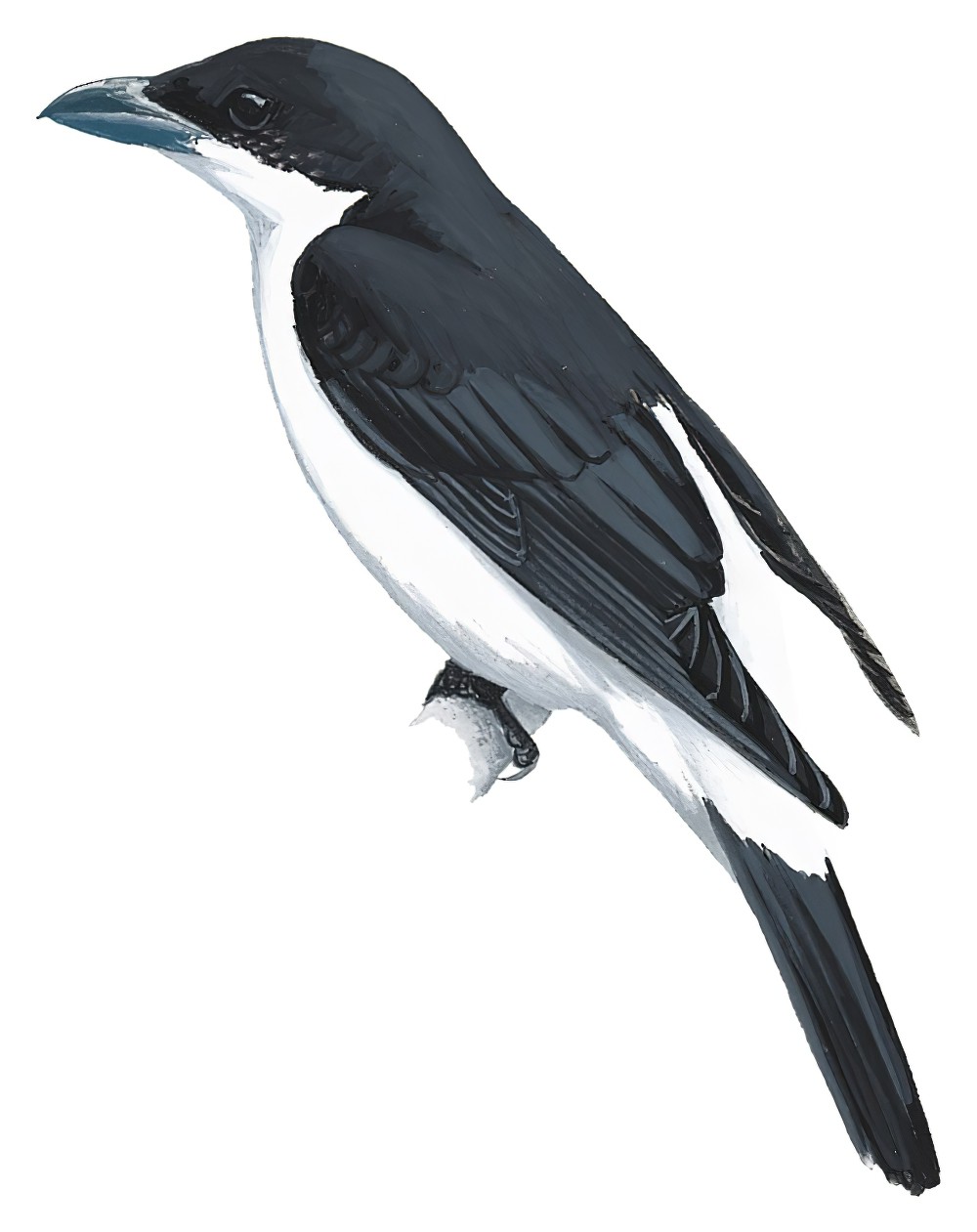Pied Cuckooshrike / Coracina bicolor

Pied Cuckooshrike
SCI Name:
Protonym: Ceblepyris bicolor Pl.Col. livr.47 pl.278
Taxonomy: Passeriformes / Campephagidae / Coracina
Taxonomy Code: piecus1
Type Locality: Sumatra, error = northern Celebes.
Author: Temminck
Publish Year: 1824
IUCN Status: Near Threatened
DEFINITIONS
CORACINA
(Campephagidae; † White-bellied Cuckooshrike C. papuensis) Gr. κορακινος korakinos little raven < dim. κοραξ korax, κορακος korakos raven < κρωζω krōzō to croak; "102. CORACINE, Coracina. Corvus, Linn. Gm. Lath. Bec glabre, ou emplumé, ou cilié à la base, épais, rétréci à la pointe, déprimé, anguleux en dessus, courbé vers le bout, entier ou échancré; mandibule inférieure un peu aplatie en dessous. 4 sections. Esp. Col-nud. — Choucari. — Choucas chauve, Buff. Céphaloptère, Geoffroy, Annales du muséum." (Vieillot 1816); "Gen. CORACINA Vieill. 1816. *) Raupendohle. Graucalus Cuv. 1817. — Coronis Glog. 1827. ... *) Als Vieillot die Gattung Caracina [sic] begründete, waren von den 4 Typen derselben bereits 3 für andre Gattungen (Gymnoderus, Gymnocephalus [= Perissocephalus] und Cephalopterus Geoffr) vergeben und haben diese die Priorität. Es bleibt daher für die Gattung Coracina als Typus nur der Choucari (Corvus papuensis), welcher zugleich Typus der späteren Gattung Graucalus Cuv. ist." (Cabanis 1853); "Coracina Vieillot, 1816 (April), Analyse, p. 37. Type, by subsequent designation, "Choucari" of Buffon = Corvus papuensis Gmelin (Cabanis, 1851, Mus. Hein., Th. 1, [1850-51][= 1853], p. 62)." (Peters, 1960, IX, p. 168) (see Graucalus and Ceblepyris).
Var. Caracina, Carocina, Corvina.
Synon. Artamides, Coronis, Gazzola, Graucalus, Kinkus, Paragraucalus, Pteropodocys, Ptiladela, Volvocivora.
• (Cotingidae; syn. Cephalopterus † Ornate Umbrellabird C. ornatus) (see above).
• (Cotingidae; syn. Gymnoderus † Bare-necked Fruitcrow G. foetidus) (see above).
• (Cotingidae; syn. Perissocephalus † Capuchinbird P. tricolor) (see above).
• (Cotingidae; syn. Pyroderus † Red-ruffed Fruitcrow P. scutatus) "SUBFAM. CORACINÆ. Fruit Crows. ... South America only. CORACINA, Vieillot. (fig. 237. a, b) Front and base of the bill protected by short thick-set feathers. C. scutata. Pl. Col. 40." (Swainson 1837); "Coracina "Vieillot" Swainson, 1837, Nat. Hist. Classification Birds, II, p. 267 (not of Vieillot, 1816). Type, by monotypy, C. scutata, i.e. Coracias scutata Shaw, 1792." (JAJ 2021).
coracina / coracinus
L. coracinus raven-black < Gr. κορακινος korakinos raven-black < κοραξ korax, κορακος korakos raven < κρωζω krōzō to croak.
● ex “Grivert de Cayenne” of d’Aubenton 1765-1781, pl. 616 (syn. Saltator maximus).
bicolor
L. bicolor, bicoloris bicoloured < bi- two- < bis twice; color, coloris colour; epithet usually given to spp. with white underparts and contrastingly darker upperparts.
● ex “Crested Titmouse” of Catesby 1731, and “Mésange hupée de la Caroline” of Brisson 1760 (Baeolophus).
● ex “Coucal Noirou” of Levaillant 1807, pl. 220 (syn. Centropus nigrorufus).
● ex “Colibri Nr. 2” of Fermin 1769, “Saphir-émeraude” of de Buffon 1770-1783, and “Sapphire-and-Emerald Humming-bird” of Latham 1782 (Cyanophaia).
● ex “Pic varié de la Encénade” of d’Aubenton 1765-1781, pl. 748, fig.1, and “Encenada Woodpecker” of Latham 1782 (syn. Dendrocopos lignarius).
● ex “Pato roxo y negro” of de Azara 1802-1805, no. 436 (Dendrocygna).
● ex “Ramier blanc mangeur de muscade de la Nouvelle Guinée” of Sonnerat 1776 (Ducula).
● ex “Gobe-mouche à ventre blanc de Cayenne” of d’Aubenton 1765-1781, pl. 566, fig. 3, and de Buffon 1770-1786, and “Black and white Fly-catcher” of Edwards 1758, and Latham 1783 (syn. Fluvicola pica).
● ex "Merle brun du Cap de Bonne Espérance" of de Buffon 1770-1783, and "White-rumped Thrush" of Latham 1783 (Lamprotornis).
● ex "Bahama Sparrow" of Catesby 1731 (Melanospiza).
● ex “Petit Guêpier du Sénégal” of d’Aubenton 1765-1781, pl. 318 (?syn. Merops hirundineus).
● ex “Guêpier de l’isle de France” of d’Aubenton 1765-1781, pl. 252 (syn. Merops viridis).
● ex “Schet Noir” of Levaillant 1805, pl. 148 (syn. Terpsiphone mutata).
UPPERCASE: current genus
Uppercase first letter: generic synonym
● and ● See: generic homonyms
lowercase: species and subspecies
●: early names, variants, mispellings
‡: extinct
†: type species
Gr.: ancient Greek
L.: Latin
<: derived from
syn: synonym of
/: separates historical and modern geographic names
ex: based on
TL: type locality
OD: original diagnosis (genus) or original description (species)












